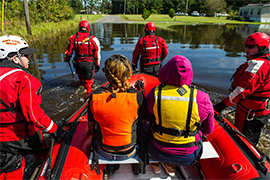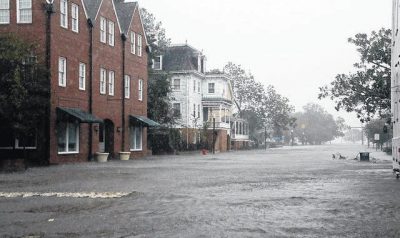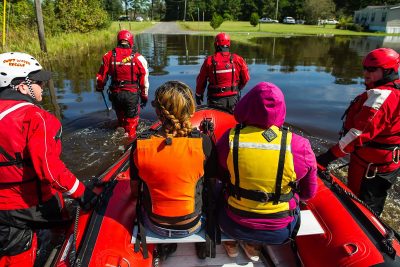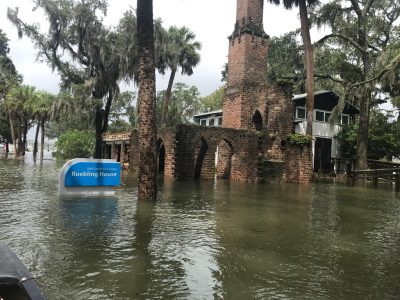$404,000 Grant Funds Stetson’s Water Institute and South Atlantic Region Project


Many coastal cities are sinking and becoming more susceptible to climate change. As the world and oceans become warmer, rising sea levels will continue to cause flooding and storm surge in low-lying areas. A new grant gives researchers throughout the Southeast the opportunity to discover green infrastructure solutions to mitigate the effects of this flooding on coastal communities.
The Institute for Water and Environmental Resilience (IWER) at Stetson University is collaborating with the National Oceanographic and Atmospheric Administration’s Office of Coastal Management and Sea Grant College Programs in Florida, Georgia, and North and South Carolina to evaluate green infrastructure interventions for reducing flood risks. The research opportunity is made possible by funding from a $404,000, two-year Karl Havens Memorial South Atlantic Regional Research on Coastal Community Resilience Grant.

“The goal of the project is to assess how green infrastructure interventions — like natural land conservation and restoration of coastal wetlands, oyster reefs and beach dunes — may provide cost-effective flood mitigation within essential transportation networks,” said Jason Evans, PhD, interim executive director of IWER and the grant project’s team leader. “Each state team is working closely with its partner communities to develop project recommendations. The team works very well together because of its overall spirit of collegiality, collaboration and commitment to furthering long-term resilience of coastal communities.”
Stetson’s environmental science and studies students will have an opportunity to intern with the East Central Florida Regional Planning Council, assist with implementing key project objectives and work directly with the country’s leading resilience experts.
IWER has conducted sea-level rise vulnerability assessments and developed adaptation planning strategies for numerous local governments in the past, and often in collaboration with research and outreach partners from Florida Sea Grant, the East Central Florida Regional Planning Council and other universities throughout the southeast region.

“IWER’s mission includes conducting advanced research methods and outreach that promotes creative solutions to complex environmental challenges,” said Evans. “Being selected to lead this grant-funded project in partnership with university collaborators, a diverse set of coastal communities and planning professionals, and the Sea Grant College Program’s network of outreach specialists, is a clear indication that IWER’s high-impact experiences and capabilities have been well-recognized.”
Earlier this year, Evans, et al, presented recently published research findings at the Environmental Law and Policy Annual Review (ELPAR) symposium at Vanderbilt University.
“Roads to Nowhere in Four States: State and Local Governments in the Atlantic Southeast Facing Sea-Level Rise,” published in the Columbia Journal of Environmental Law, discusses how local and state governments in Florida, Georgia, and North and South Carolina are handling sea-level rise issues and road infrastructure. The research paper was selected by a review committee as one of the top four journal articles in 2019 to be published in ELPAR’s special issue of the Environmental Law Reporter.

In addition to Evans, project researchers include Chris de Bodisco, PhD, assistant professor of economics at Stetson; Shana Jones, JD, planning and environmental services unit program manager, J. Scott Pippin, JD, public service associate and Jon Calabria, PhD, associate professor of environment and design at the University of Georgia; Daniel Hitchcock, PhD, associate professor of agricultural sciences at Clemson University Baruch Institute of Coastal Ecology and Forest Science; Narcisa Pricope, PhD, associate professor of geography at the University of North Carolina Wilmington; and Tara McCue, AICP, director of planning and community development and Luis Nieves-Ruiz, AICP, economic development program manager at the East Central Florida Regional Planning Council.
Partner communities include Cape Canaveral, Florida; Garden City, Georgia; New Bern, North Carolina; New Hanover County in North Carolina; and Georgetown County in South Carolina. The cities and counties will be working with the lead researcher in its state to identify specific project sites for possible green infrastructure interventions as well as develop cost-benefit analysis models for providing a range of estimates for long-term values, including flood protection, habitat creation and preservation, contaminant mitigation and the integration of green spaces within a built environment.
-Sandra Carr



